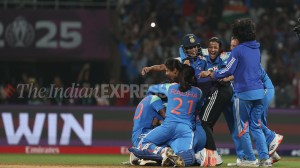In quiet Delhi corner,diplomats discuss murder,Arctic chill,drunken detectives
The envoys were not comparing notes about child homicide in their country.
The Danes were getting ready to vote in their first woman Prime Minister but in Delhi,Danish Ambassador Freddy Svane was talking about something else of a boy,Isaiah,who seemingly fell to his death in wintry Copenhagen. Snow was everywhere. Qanik,they call it. Big,almost weightless crystals falling in clumps. They fell on Isaiahs body as well,but was his death an accident or was it cold-blooded murder?
Icelandic Ambassador Gudmundur Eiriksson had something similar to say: about 10-year-old Eli who was stabbed to his death and was found frozen to the ground as the winds from the Arctic cut into a suburb of Reykjavik.
The envoys were not comparing notes about child homicide in their country; on an evening this week,they were acknowledging and celebrating whats often called the biggest export from Nordic countries in recent times crime fiction.
Svane and Eiriksson were joined by their Swedish counterpart Lars-Olof Lindgren with the first volume of the Stieg Larsson trilogy,The Girl with the Dragon Tattoo; the counsellor from the Norwegian Embassy,Eva Bratholm,carrying a Harry Hole novel of John Nesbo,The Snowman; and Finnish Ambassador Terhi Hakala with the least known author of them all,Matti Ronka.
Leaving behind the polite and politically correct language thats part of their diplomatic discourse,they read out,in their native languages and in English translation,passages in which blood inevitably mixed with snow and more the particular noir of Nordic with its bold political undertones.
The reading session by Nordic diplomats at Max Mueller Bhavan was an initiative by Eiriksson on the occasion of Iceland being the guest of honour at the forthcoming Frankfurt Book Fair. Eiriksson,who was fascinated by the fact that many of his countrys modern writers found inspiration in its medieval sagas and considered them the original crime fiction,decided to go further and explore the Nordic commonality represented in the fact that so much of crime fiction is coming from the most peaceful region on earth.
And why is that so?
As an Icelandic observer of trends has pointed out,crime novels are about the disturbance of social peace,and nowhere is this disturbance more drastic than in a quiet place; nowhere does murder make a deeper impression than in a region where you can hardly imagine one.
About the popularity of Nordic thrillers,Eiriksson says,They are perhaps more sophisticated than is the general rule. The protagonists are more fully developed than in most novels of the genre,and with settings which call for the exploration of social issues of the day it is not only about whodunit but what done it. They also have a better sense of place than novels set in more well known locations.
The lanky,bearded Eiriksson,who read out from Arnaldur Indridasons Arctic Chill,says the Larsson effect is undeniable,but the wave preceded him and there are many other very good authors.
Svanes choice was the exquisite Peter Hoeg novel,Smillas Sense of Snow about the Greenlander who can feel the nature and texture of the snow under her feet and on her fingertips,and who looks for clues in the snowflakes around Elis body.
A thriller fan who prizes the symbolism of Hoeg rather than the simplicity of Agatha Christie,Svane says,These crime novels take me back to my home country and help me to decode societal developments there. Such pop-lit engagements,he says,are also a new addition to a diplomats tool box.
The writings political content is undeniable: there is racism in Arctic Chill: Eli is half-Thai,half-Icelandic. There is discrimination of Greenlanders by mainland Danes in Smillas Sense of Snow. But as these Nordic diplomats sat in a half-circle,invoking drunk detectives and troubled inspectors,it was literature as diplomacy,no matter what Larsson might have thought of it.



- 01
- 02
- 03
- 04
- 05




























